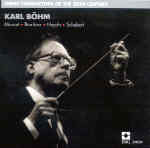Karl Böhm left a huge recorded legacy sharply focused on the central Austro-German classics and on 20th century heirs such as Berg and Strauss. For most of his career he was overshadowed by his DG stablemate, the salable Herbert von Karajan, whose smoothly textured interpretations were more heavily promoted. Both were opportunists who flourished under the Nazis and managed to land on their feet after the war. However, such integrity as Böhm possessed was directed to musical interpretations that eschewed idiosyncrasies and whose rough-hewn quality served the music without calling undue attention to the interpreter. That made him easy to take for granted, but it also stamped his performances as honest, invariably well-rehearsed and well-played renditions of both the letter and the spirit of the music. If his recordings sometimes fell a bit short of the mark it often was because they lacked spontaneity, a quality that, to judge from the two live performances that are the core of this set, Böhm supplied in abundance in concert.
Only one of the four pieces here–Mozart’s Overture to Cosi fan tutte–can be deemed a filler. It’s a brilliant reading that may sound heavy these days, but it nevertheless leaves you panting for the full opera recording from which it’s taken. In Haydn’s Symphony No. 91, Böhm’s a bit too sober for the work’s good; this fine, well-paced reading needs a smile or two to rescue it from the routine.
But the two big pieces, recorded live–Bruckner’s Eighth and Schubert’s Ninth–make this a set to treasure. The Bruckner is a 1979 broadcast with the Cologne Radio Symphony. Like all of Böhm’s Bruckner that I’ve heard, it’s fast-paced; the outer movements are fiery, the central Adagio is done with rapt concentration, and the Cologne strings are especially fine. Although there’s a Bruckner Eighth available on CD to suit every taste–straight-ahead, mystical, fast, slow, you name it–this strikes me as one of the very best, catching the then-80-year-old conductor in top form.
If anything the Schubert is even better, one of the great recorded Ninths, even more remarkable for the energy displayed by a now 85-year-old Böhm. He leads the Dresden Staatskapelle Orchetra, whose rounded wind tones and ardent strings shine in an interpretation full of brio and spirit. The work sometimes can sound disjointed when Schubert’s quick shifts from string-based melodies to brass-led rhythmic mottos are too loosely knit. Here, Böhm’s transitions are seamless, his tempos flexible, and Schubert’s powerful rhythms are given full due. Engineering throughout is excellent; only the broadcast tapes of the Bruckner are slightly below the best studio standards of the time. If the purpose of EMI’s uneven series is to establish the “greatness” of the chosen conductors, then this Böhm set succeeds.
































